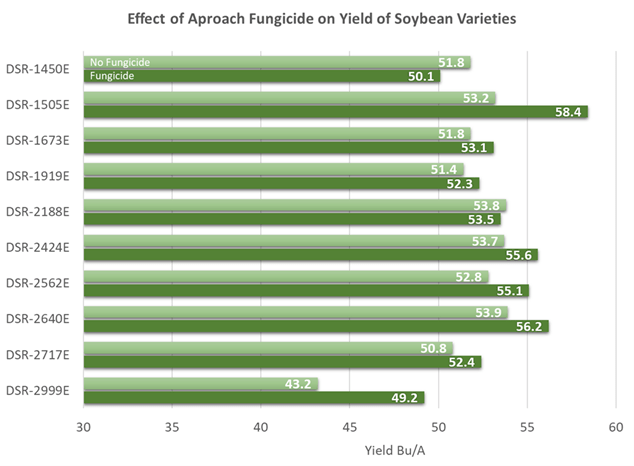Product and Agronomy Research (PAR) Results: Soybean Variety Comparison & Fungicide Study
BY Dairyland Seed Agronomy Team
Soybean Variety Comparison & Fungicide Study
Description:
This trial is to show variety performance comparisons for group 1.4 – 2.9 soybeans, with and without foliar applied fungicide. Fungal disease may be suppressed or controlled through varietal selection and the use of fungicides. The fungicide used not only controls white mold but is labeled for other foliar diseases in soybeans.
St. Johns, MI
DSR-1450E™, DSR-1505E™, DSR-1673E™, DSR-1919E™, DSR-2188E™, DSR-2424E™, DSR-2562E™, DSR-2640E™, DSR-2717E™ and DSR-2999E™ were planted at 135,000 plants per acre in 30-inch rows on May 12, 2022.
Treatments:
- No fungicide application
- Aproach (9 oz/A) applied at R3 beginning pod
Results:
Effect of Aproach Fungicide on Yield of Soybean Varieties

Conclusion:
The weather this year during the growing season was drier than usual and resulted in a low disease pressure year. In this plot, there was no instance of white mold or other yield limiting diseases. Some Septoria brown spot was noted but that is not usually associated with significant yield loss. The soybean varieties treated with Aproach fungicide appeared slightly healthier than the untreated varieties and resulted in a 2 bushel per acre average advantage. In a year with higher disease pressure, the benefit to using fungicide is expected to be significantly higher. In any year it is best to monitor disease risk and select the best timing for fungicide application.
 |
 |
 |
 |
 |
| Brian Weller Western Region 507.456.3034 |
Dan Ritter Central Region 219.863.0583 |
Branden Furseth Northern Region 608.513.4265 |
Mark Gibson Eastern Region 260.330.8968 |
Amanda Goffnett Eastern Region 989.400.3793 |
